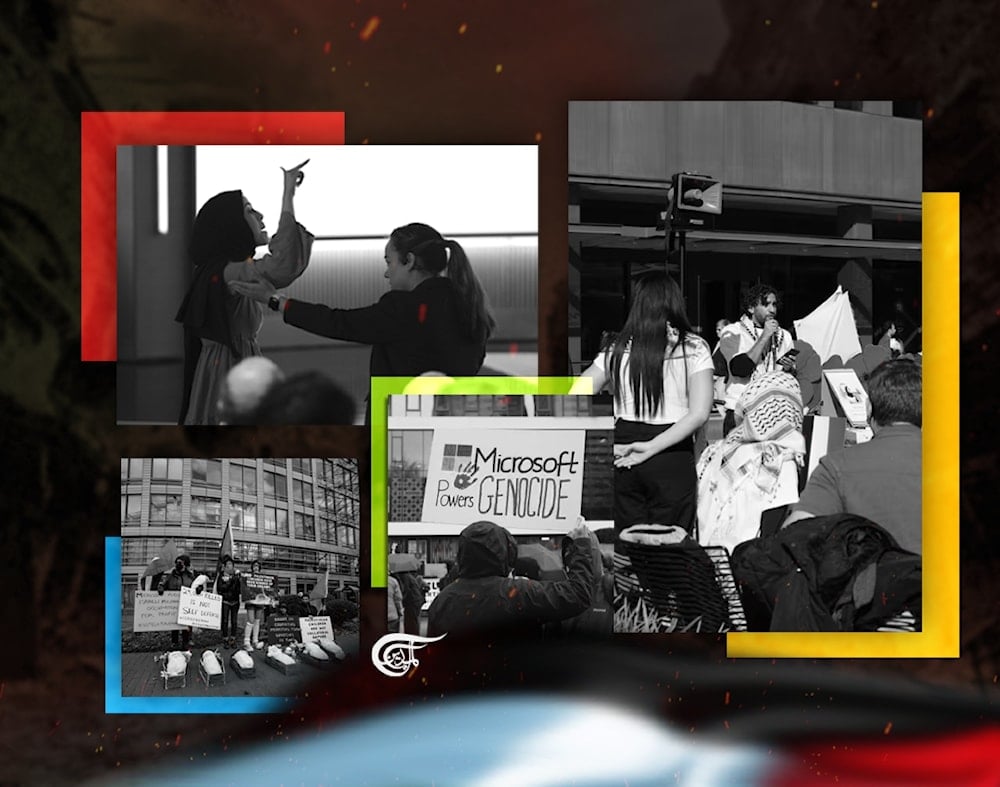Protests grow inside Microsoft over Gaza war links
The protests reflect a broader movement of tech worker activism, echoing similar protests inside companies like Google, where employees have also challenged military-linked contracts.
-
 An illustration shows demonstrations against Microsoft's reported involvement in the Israeli genocide in Gaza (Zeinab El Hajj - Al Mayadeen English)
An illustration shows demonstrations against Microsoft's reported involvement in the Israeli genocide in Gaza (Zeinab El Hajj - Al Mayadeen English)
Internal unrest is mounting at Microsoft as employees protest the company’s reported involvement in the Israeli genocide in Gaza, The Guardian reported on Friday.
For the second time in a month, staff interrupted a high-profile event—this time during Microsoft’s 50th anniversary celebration on April 4—accusing the company of complicity in what they described as war crimes in Gaza.
During the celebration, AI executive Mustafa Suleyman was interrupted by employees Ibtihal Aboussad and Vaniya Agrawal, both of whom were fired days later. The incident follows a March 20 protest at Seattle’s Great Hall, where Microsoft President Brad Smith and former CEO Steve Ballmer were shouted down by a current and a former employee.
Anniversary disruption highlights employee frustration
Outside the April event, demonstrators projected the message “Microsoft powers genocide” onto the venue’s exterior. The accusation refers to "Israel’s" use of Microsoft’s AI and cloud infrastructure amid its ongoing Israeli aggression since October 7. As reported by The Guardian, cloud computing has become nearly as vital to "Israel’s" campaign as physical weapons.
These actions reflect a broader movement of tech worker activism, echoing similar protests inside companies like Google, where employees have also challenged military-linked contracts.
Fired staff speak out as protests escalate
Former Microsoft engineer Hossam Nasr called the current situation “very close to a tipping point,” citing recent disruptions, a February protest at Microsoft’s first in-person town hall since the pandemic, and an October vigil for Palestinians. Both Nasr and researcher Abdo Mohamed, who helped organize the vigil, were dismissed shortly afterward.
In February, five employees wore T-shirts that spelled out: “Does Our Code Kill Kids, Satya?”—a direct message to CEO Satya Nadella. They were quietly removed from the event. Aboussad, also recently fired, said her discomfort working in AI at Microsoft had been building for months.
“There’s no way I can stay at Microsoft and have clean hands,” she said, referencing reports of the company’s expanding ties to the Israeli occupation.
An AP investigation, which detailed the use of AI systems in targeting operations, was the “last straw.”
While Microsoft’s anonymized contracts make it difficult for employees to track how their work is used, Aboussad said, “I’m not confident my paycheck doesn’t originate from money that comes from the Israeli government.”
The role of AI and Cloud in Gaza genocide
The protests center on Microsoft’s Azure platform and its role in "Israel’s" military infrastructure. Internal criticism intensified following media reports from outlets including Dropsite, The Guardian, +972 Magazine, and the Associated Press, which highlighted the strategic value of AI and cloud systems in "Israel’s" war policies.
In response, the internal campaign "No Azure for Apartheid" gained traction within Microsoft and beyond. On April 3, the Boycott, Divestment, Sanctions (BDS) movement added Microsoft to its official boycott list.
“A lot of tech workers exist in a bubble, and Microsoft wants to keep it that way,” said employee Anna Hattle. “An employee who doesn’t know their work is being used for AI weapons isn’t going to do anything about it.”
From message boards to movement: Internal resistance grows
Initially, dissent surfaced on Microsoft’s Viva Engage message board. Posts criticizing "Israel" or expressing support for Palestinian civilians were often met with accusations of supporting terrorism. Microsoft eventually shut down posting in its “All Company” channel, cutting off discussion from its 400,000 global staff and contractors.
One internal complaint focused on a post describing Israeli actions as “ethnic cleansing,” prompting a response from Microsoft’s Global Employee Relations Team, which urged employees to uphold “respect and kindness” in discussing global events.
Efforts to raise awareness have been repeatedly curtailed. In November 2023, a planned event featuring Palestinian journalist Ahmed Shihab-Eldin was canceled after backlash from Israeli employees, who alleged the event was "antisemitic". One employee described seeing internal posts calling Palestinians “Killers. Terrorists. Monsters.”
Echoes of the past: Comparing to South Africa divestment
Former employee Angela Yu made headlines in December when she resigned publicly via email to nearly 30,000 colleagues.
“It hurts my conscience to know that the products you and I work on are enabling the Israeli military to accelerate its project of ethnic cleansing,” she wrote.
Yu drew a historical parallel to 1986, when Microsoft severed business ties with apartheid-era South Africa. At that time, the company’s global revenue was just $100 million—less than the value of a single current contract with "Israel’s" Ministry of Security.
Despite internal crackdowns and dismissals, employee resistance shows no signs of fading. As one current staff member put it: “The company is a money machine. All they care about is money. AI and work, work, work.”

 5 Min Read
5 Min Read








